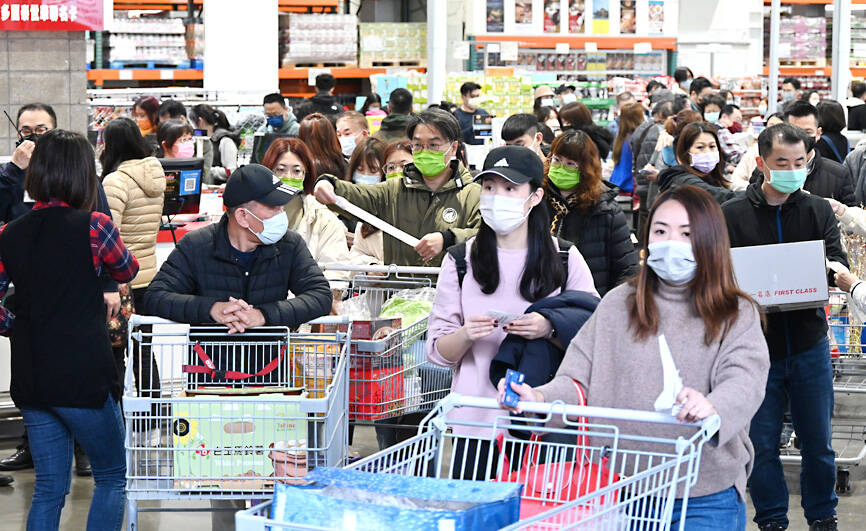Sales in the wholesale sector last month rose 3.4 percent year-on-year to NT$1.036 trillion (US$33.27 billion), after declining for 12 consecutive months, the Ministry of Economic Affairs said yesterday.
The wholesale sector’s sales growth returned to positive territory thanks to an increase in demand for machinery equipment, pharmaceuticals and cosmetics, as well as automobiles and motorcycles, compared with a year earlier, the ministry said in a report.
In addition, the growing demand for artificial intelligence applications helped minimize the impact of weakening demand for consumer electronics devices, it said.

Photo: Liu Hsin-de, Taipei Times
However, the sector might experience relatively flat annual sales growth this month, as end-market demand remains weak and customers are tending to be conservative about placing orders, the report said.
The wholesale sector’s cumulative sales in the first 11 months of this year fell 7.8 percent year-on-year to NT$10.74 trillion, while sales for this month are estimated to either fall 1.4 percent or rise 1.6 percent annually to between NT$1.037 trillion and NT$1.069 trillion, the ministry said.
Meanwhile, sales in the retail sector last month increased 7.3 percent year-on-year to NT$411.9 billion, rising for 27 consecutive months to hit the highest level for the same month, the report said, citing factors such as department store anniversary sales and the Double 11 Singles' Day online shopping festival.
As for the food and beverage sector, sales last month climbed 8 percent to NT$81.3 billion, marking the 19th straight month of increase but decelerating from the previous month's 11.1 percent growth, it said.
The retail and food and beverage sectors’ growth momentum would continue this month as consumer spending is expected to increase during the festive season, while auto dealers are adopting aggressive promotional campaigns and firms are holding banquets for their employees, the report said.
In addition, the diffusion index compiled by the ministry — a gauge of firms’ sales expectations for the following month — rose to 50.8 for the retail sector and 75.4 for the food and beverage sector, both of which were above the threshold of 50 suggesting a positive outlook.
In the first 11 months of this year, retail sales rose 7.5 percent from a year earlier to NT$4.17 trillion, the highest for the period, the ministry said, adding that it expects retail sales to grow between 2.8 and 5.8 percent annually to between NT$414.1 billion and NT$426.2 billion this month.
Food and beverage sales totaled NT$933.6 billion over the 11 months, up 20 percent year-on-year and also the highest for the period, while sales this month are projected to grow 3 to 6 percent annually to between NT$90.2 billion and NT$92.8 billion, it said.

When an apartment comes up for rent in Germany’s big cities, hundreds of prospective tenants often queue down the street to view it, but the acute shortage of affordable housing is getting scant attention ahead of today’s snap general election. “Housing is one of the main problems for people, but nobody talks about it, nobody takes it seriously,” said Andreas Ibel, president of Build Europe, an association representing housing developers. Migration and the sluggish economy top the list of voters’ concerns, but analysts say housing policy fails to break through as returns on investment take time to register, making the

‘SILVER LINING’: Although the news caused TSMC to fall on the local market, an analyst said that as tariffs are not set to go into effect until April, there is still time for negotiations US President Donald Trump on Tuesday said that he would likely impose tariffs on semiconductor, automobile and pharmaceutical imports of about 25 percent, with an announcement coming as soon as April 2 in a move that would represent a dramatic widening of the US leader’s trade war. “I probably will tell you that on April 2, but it’ll be in the neighborhood of 25 percent,” Trump told reporters at his Mar-a-Lago club when asked about his plan for auto tariffs. Asked about similar levies on pharmaceutical drugs and semiconductors, the president said that “it’ll be 25 percent and higher, and it’ll

CHIP BOOM: Revenue for the semiconductor industry is set to reach US$1 trillion by 2032, opening up opportunities for the chip pacakging and testing company, it said ASE Technology Holding Co (日月光投控), the world’s largest provider of outsourced semiconductor assembly and test (OSAT) services, yesterday launched a new advanced manufacturing facility in Penang, Malaysia, aiming to meet growing demand for emerging technologies such as generative artificial intelligence (AI) applications. The US$300 million facility is a critical step in expanding ASE’s global footprint, offering an alternative for customers from the US, Europe, Japan, South Korea and China to assemble and test chips outside of Taiwan amid efforts to diversify supply chains. The plant, the company’s fifth in Malaysia, is part of a strategic expansion plan that would more than triple

Taiwanese artificial intelligence (AI) server makers are expected to make major investments in Texas in May after US President Donald Trump’s first 100 days in office and amid his rising tariff threats, Taiwan Electrical and Electronic Manufacturers’ Association (TEEMA, 台灣電子電機公會) chairman Richard Lee (李詩欽) said yesterday. The association led a delegation of seven AI server manufacturers to Washington, as well as the US states of California, Texas and New Mexico, to discuss land and tax issues, as Taiwanese firms speed up their production plans in the US with many of them seeing Texas as their top option for investment, Lee said. The